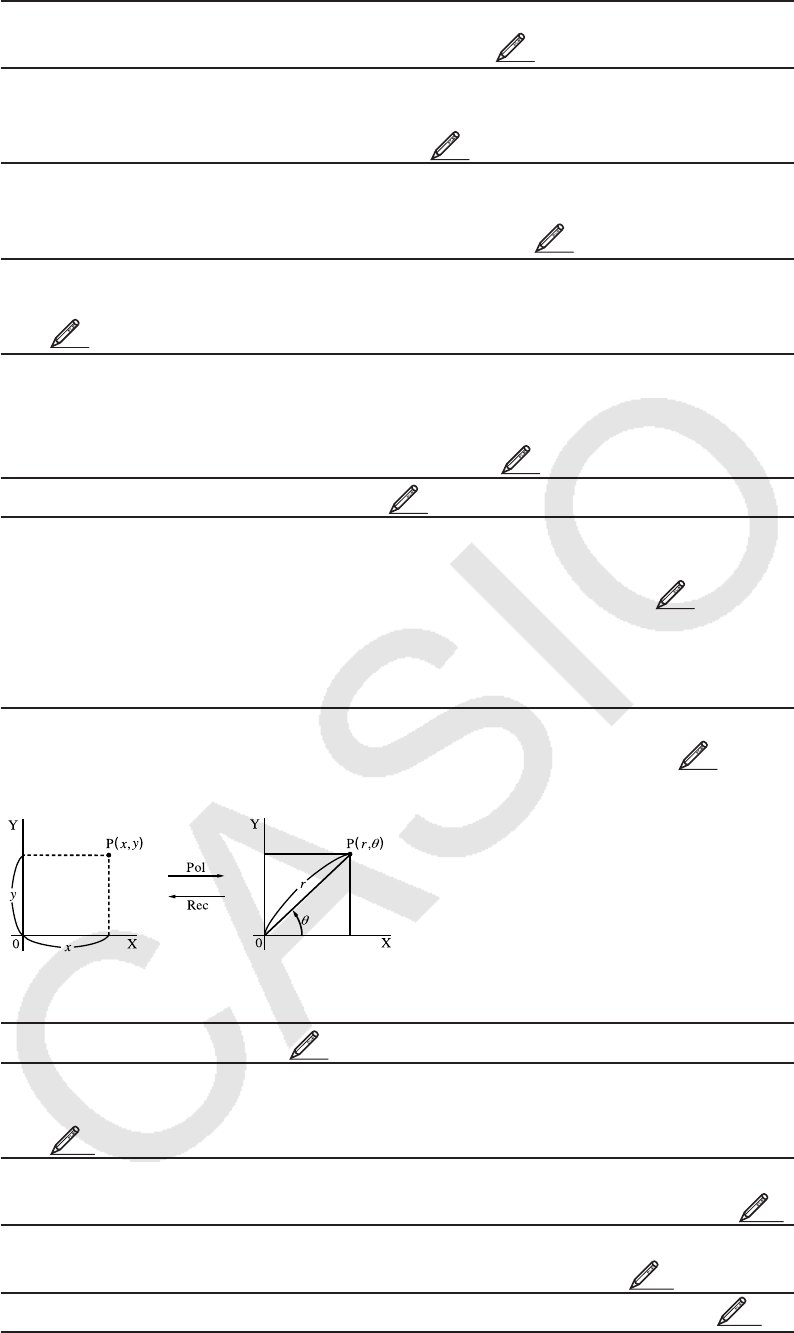
E-19
sin, cos, tan, sin
−1
, cos
−1
, tan
−1
: Trigonometric functions. Specify the
angle unit before performing calculations. See
1
.
sinh, cosh, tanh, sinh
−1
, cosh
−1
, tanh
−1
: Hyperbolic functions. Input a
function from the menu that appears when you press w. The angle unit
setting does not affect calculations. See
2
.
°,
r
,
g
: These functions specify the angle unit. ° specifies degrees,
r
radians,
and
g
grads. Input a function from the menu that appears when you perform
the following key operation: 1G(DRG '). See
3
.
$, %
: Exponential functions. Note that the input method is different
depending upon whether you are using Natural Display or Linear Display.
See
4
.
log
: Logarithmic function. Use the l key to input log
a
b as log ( a , b ). Base
10 is the default setting if you do not input anything for
a . The & key also
can be used for input, but only while Natural Display is selected. In this
case, you must input a value for the base. See
5
.
ln
: Natural logarithm to base e . See
6
.
x
2
, x
3
, x ^, ), #, ", x
−1
: Powers, power roots, and reciprocals. Note
that the input methods for
x ^, ), #, and " are different depending upon
whether you are using Natural Display or Linear Display. See
7
.
Note: The following functions cannot be input in consecutive sequence: x
2
,
x
3
, x ^, x
−1
. If you input 2 ww, for example, the final w will be ignored. To
input
2
2
2
, input 2 w, press the d key, and then press w( B).
Pol, Rec : Pol converts rectangular coordinates to polar coordinates, while
Rec converts polar coordinates to rectangular coordinates. See
8
.
Pol(
x , y ) = ( r , Ƨ ) Rec( r , Ƨ ) = ( x , y )
Rectangular Polar
Coordinates (Rec) Coordinates (Pol)
Specify the angle unit before
performing calculations.
The calculation result for
r and Ƨ
and for
x and y are each assigned
respectively to variables X and Y.
Calculation result
θ
is displayed
in the range of −180° Ͻ
θ
Ϲ
180°.
x ! : Factorial function. See
9
.
Abs : Absolute value function. Note that the input method is different
depending upon whether you are using Natural Display or Linear Display.
See
10
.
Ran# : Generates a 3-digit pseudo random number that is less than 1. The
result is displayed as a fraction when Natural Display is selected. See
11
.
RanInt# : For input of the function of the form RanInt#( a , b ), which
generates a random integer within the range of
a to b . See
12
.
n P r , n C r : Permutation ( n P r ) and combination ( n C r ) functions. See
13
.
Rnd : The argument of this function is made a decimal value and then
rounded in accordance with the current number of display digits setting
(Norm, Fix, or Sci). With Norm 1 or Norm 2, the argument is rounded off
to 10 digits. With Fix and Sci, the argument is rounded off to the specified
digit. When Fix 3 is the display digits setting, for example, the result of
10 ÷ 3 is displayed as 3.333, while the calculator maintains a value of
3.33333333333333 (15 digits) internally for calculation. In the case of


















